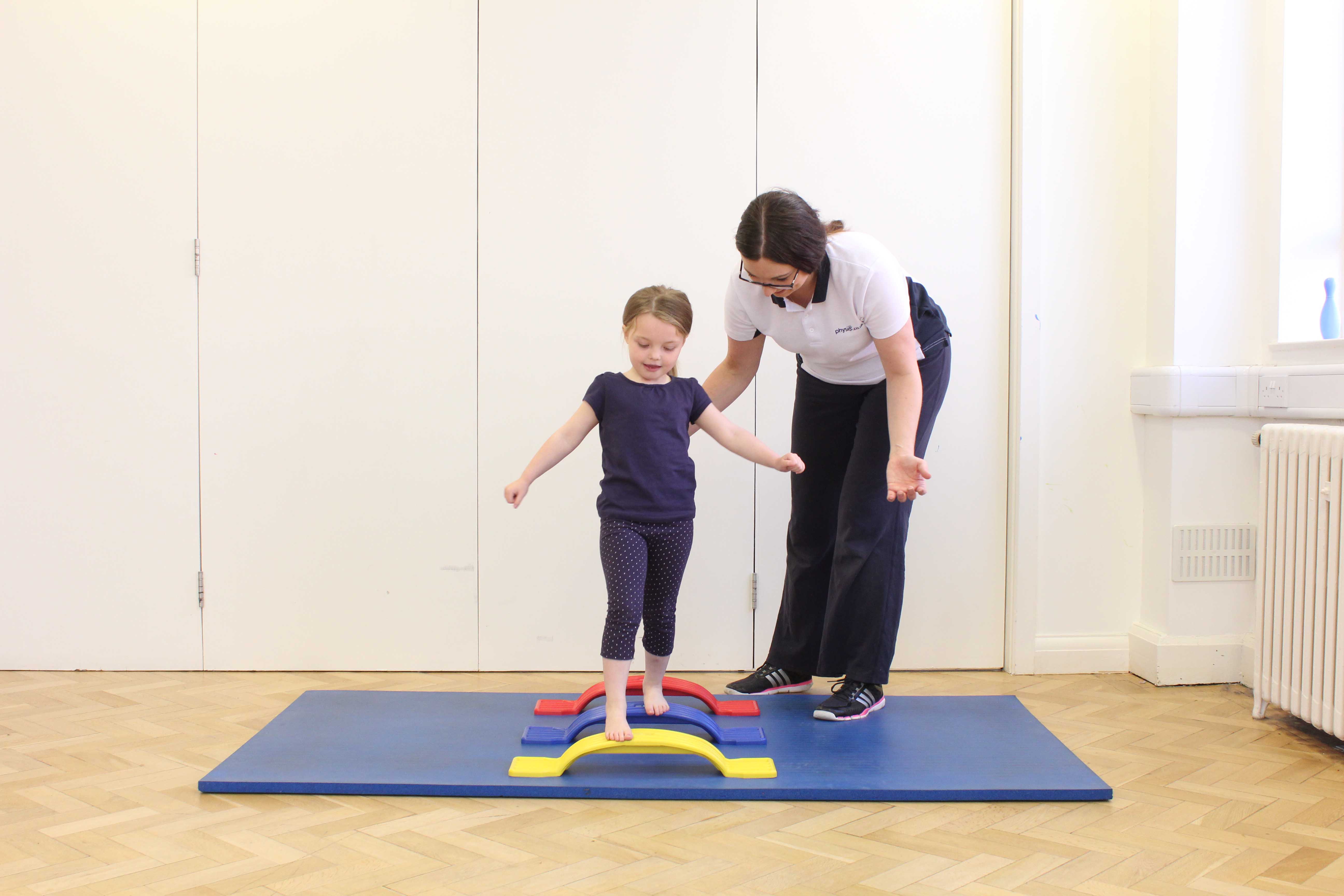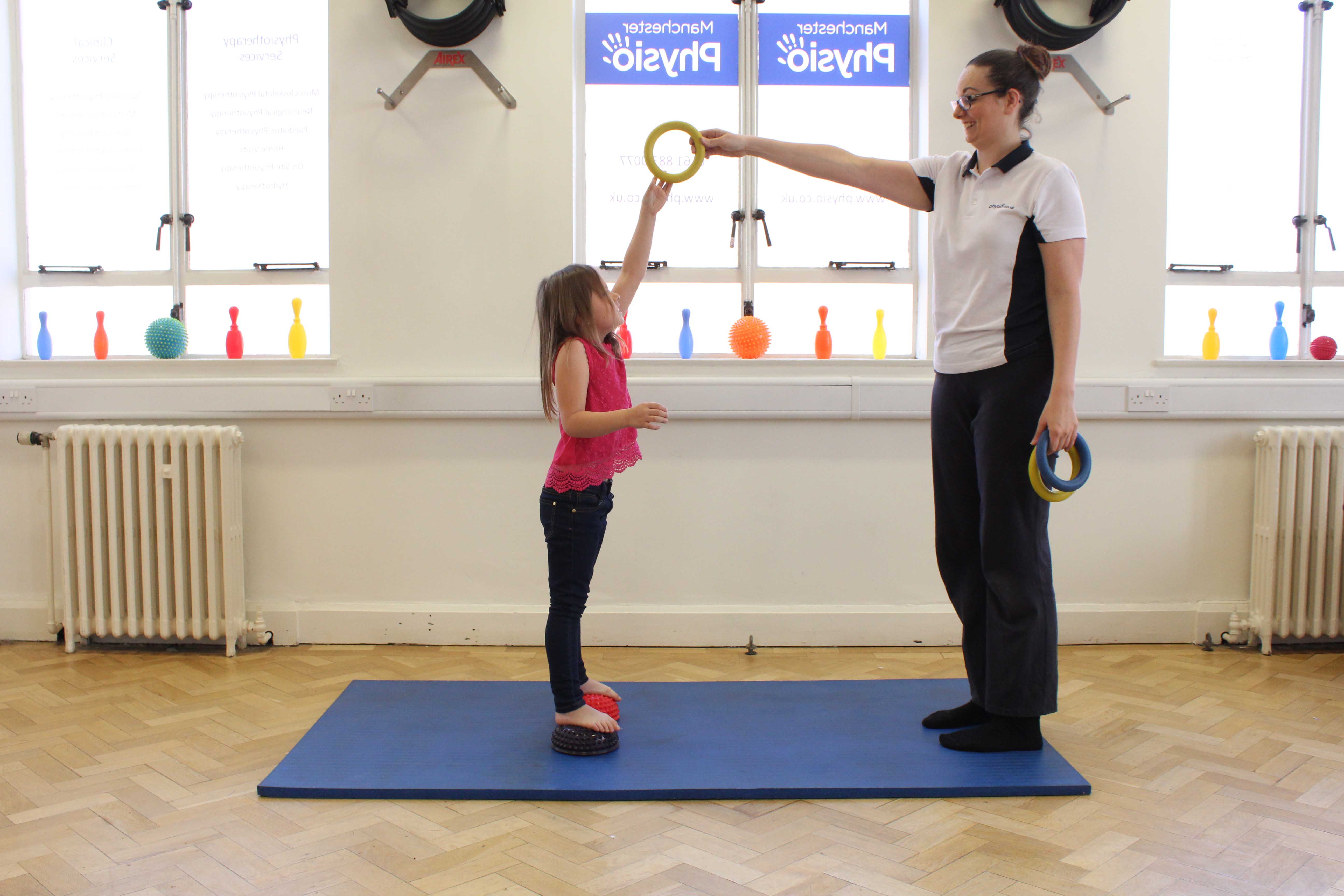What are paediatric gross motor skills?
Gross motor skills involve the coordination of the large muscles of the body that enable a child to perform activities such as walking, running, kicking, lifting, sitting upright and throwing. Gross motor skills are normally developed during infancy and early childhood. This development means that on average, children are able to stand up, walk and run by the age of two. A child’s gross motor skills continue to improve throughout their early years and develop further until adulthood.
 Above: Working on co-ordination of gross motor skills
Above: Working on co-ordination of gross motor skillsDevelopment timeline
There is a normal pattern to a child’s gross motor development as shown below. If the child is behind this timeline then they may have problems with their gross motor skills. Any gross motor skill requires postural control and depends highly on muscle tone, balance and strength. The effective development of gross motor skills in early childhood is essential.
6 months
Raises head and arms up to be lifted when lying on back.
When lying on front, can roll onto back.
When lying on front, can raise head and chest and support themselves on extended arms.
12 months
Can sit from lying with ease.
Can crawl or shuffle.
Walks with one or both hands held.
18 months
Can walk with feet slightly apart and start and stop safely.
Can move large objects along the floor.
Can walk upstairs while holding a hand and sometimes downstairs.
2 years
Runs safely and can stop and start and avoid obstacles.
Climbs onto and off furniture.
Can walk upstairs and downstairs using a rail, two feet to a step.
3 years
Can walk upstairs carrying large toy, with one foot to each step.
Can turn corners and turn around obstacles while running.
Can walk on tiptoe and stand on one foot briefly when shown.
4 years
Able to stand, walk and run on tiptoe.
Can climb ladders and trees.
Can hop on preferred foot.
Impairments of gross motor skills in children
Gross motor skills are important for primary body movements such as walking, coordination, posture and balance. Impairment in a child’s gross motor skills can affect their ability to sit or stand upright therefore influencing other functions such as fine motor skills for example writing and picking up objects. Gross motor skill dysfunction can be caused by a number of factors including disabling conditions, neurological impairments, illness, delayed development or injury. Weaknesses in the muscles responsible for gross motor skills can lead to mild affected fatigue and results in difficulty carrying out certain activities in childhood and adulthood such as:
- Walking
- Jogging
- Jumping
- Reaching
- Sitting upright independently
- Standing upright independently
- Picking objects up
 Above: challanging gross motor skill control
Above: challanging gross motor skill controlWhat can physiotherapy do to help children with reducedgross motor skills?
Physiotherapy is vital to improve the development of important gross motor skills such as effective posture, walking, balance and coordination. Specialist physiotherapists at Physio.co.uk will provide the child with a thorough assessment that will help identify key problems and weaknesses that are affecting gross motor skill development. The physiotherapist will then have a clear view on how to move forward and treat the child’s development problems using a variety of methods and activities. Gross motor skills can be dramatically improved by therapy and your physiotherapist will ensure the activities are both fun and functionally based. Activities include:
- Throwing and catching games
- Running and changing direction
- Jumping activities
- Climbing activities
- Balancing activities
- Target practice e.g. shooting a ball in a net
- Ball games e.g. kicking, dribbling, throwing, batting
- Skipping activities
What are the benefits of physiotherapy for children with reduced gross motor skills?
Physiotherapy can have several benefits for children with reduced gross motor skills. These can include:
- Improving the child’s control of large movements
- Improving the child’s coordination during large movements
- Increasing strength in large muscle groups
- Improving the child’s overall function such as walking, running and jumping.
Summary
Gross motor skills are the small muscle movements that are responsible for functions such as walking, jumping, reaching, and sitting or standing in an upright position. Impairments in gross motor skills can be caused by neurological conditions, trauma, illness and delayed development. Problems with the development of gross motor skills can cause difficulties attempting certain activities such as walking, sitting upright, and standing, reaching and jumping. Physiotherapy is an effective method of treatment to help improve the development of the child’s gross motor skills. Specialist physiotherapists at Physio.co.uk will carry out an assessment to identify the child’s problems and will provide a treatment plan involving a number of activities to improve their gross motor skill development.
To book an appointment or for more information about paediatric gross motor skills contact us or call 0330 088 7800.

 0330 088 7800
0330 088 7800


































